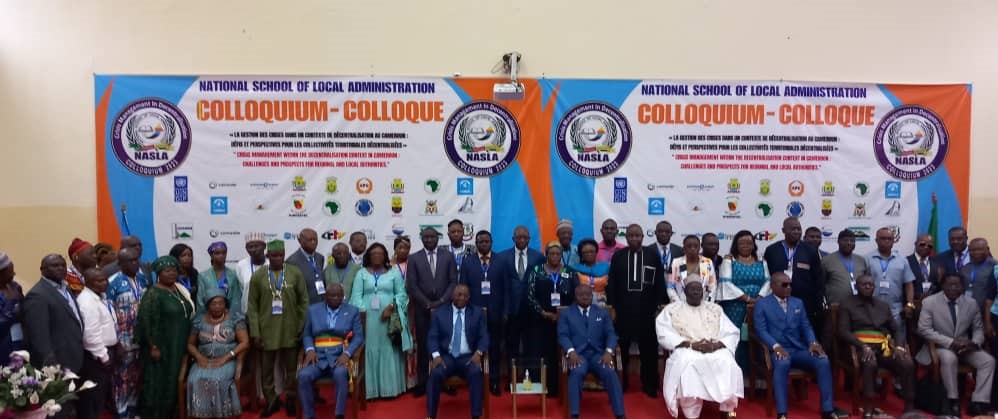The Office of the Public Independent Conciliator was amongst stakeholders of the Decentralization process who met from the 21 to 23 June 2023 to discuss the management of crisis at the first ever colloquium organized by the National School of Local Administration (NASLA).
The colloquium organized on the theme “Crisis Management within the Decentralization Context: Challenges and Prospects for Regional and Local Authorities” assembled participants from the public administration, specialized public institutions, regional and local Authorities, donors, Civil Society Organization, the academia and private sector from all over the national territory to identify and examine crisis that Regional and Local Authorities are called to manage; the challenges they face as well as suggest solutions to enable them better handle them.

Mme the Public Independent amongst top dignitaries during the opening ceremony of the Colloquium
Considering the rationale that Regional and Local Authorities by the law governing decentralization in Cameroon have been transferred the competence to manage crisis whether natural, health and human, the colloquium through four round tables and seven parallel sessions, examined different dimensions of crisis, explored diverse spectrum of solutions and shared experience of cases handled in the past that can serve as models.
 OPIC staff amongst other participants during the plenary sessions
OPIC staff amongst other participants during the plenary sessions
While presenting the inaugural lesson during the opening ceremony, Philip Ngole Ngwese, former minister of Forestry and Wildlife had set the ball rolling concerning some envisage solutions that can facilitate better management of crisis by Regional and Local Authorities. In his paper the former statesman amongst suggested the need for concerted solution and consultation forums between regional and local authorities and collaboration with administrative authorities as the essentials to start with a crisis occurs. He went further to mention that the three-way relationship between the local authority, state representative and local population must be taken into consideration.

In addition to these suggestions were recommendations addressed at the end of the plenary and parallel sessions to NASLA, Regional and Local Authorities and Public authorities. Some of the recommendations include, the effective coordination between local and central government bodies for efficient operational risk management, the promotion of the culture of living together within communities, the strengthening of capacity-building of Regional and Local authorities staff, municipal and regional executives, administrative and decentralized State services on crisis management issues and the mastery of decentralization texts, use of insurance companies to prevent and manage risks and disasters, use of information and communication technologies to optimize warning system and so on.
It is worthy to mention that the Office of the Public Independent Conciliator was very much present during the discussions both at the level of the round tables and parallel sessions.


